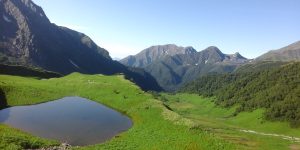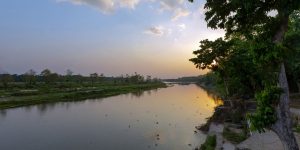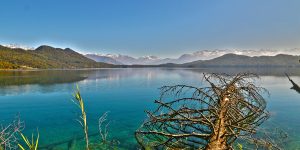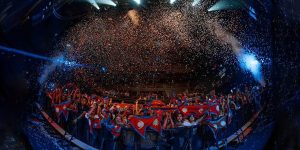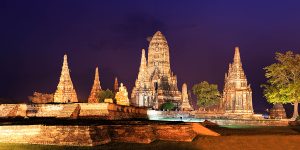One of the fastest growing economies in East Africa, Rwanda sustained high GDP growth of around 8% per year between 2001 and 2013. When I first visited the country in 2013, I was impressed by its fresh out of school attitude with its high aspirations, ambitions and risk-taking nature. Rwanda was geared to conquer the world and retain its claim of being the fastest growing economy in Africa. Rwanda had visions of being the “Singapore of Africa”, which seemed chimerical back them—similar to the tall claims of Nepali politicians.
Half a decade later, I was pleasantly surprised to learn that many of Rwanda’s aspirational plans and projects have come to fruition. By 2018, Rwanda has become a more mature country, already on its way to become a leading nation in Africa. To rebuild the Rwandan economy post-genocide seemed a herculean task but Rwandans have demonstrated that ideas and plans can come to fruition with strong leadership and political will. Having spent more than 400 days in the country, I have a soft corner for Rwanda. Rwanda exemplifies resilience and the ability to deliver and closely aligns with beed’s DNA—to dream, achieve and celebrate.
Of Rwanda’s many achievements in the recent past, the following are key milestones that carry lessons for Nepal:
Completion of Kigali Convention Centre. Rwanda has long had aspirations to position itself as the regional hub for the East African Community. In keeping with this vision, a country approximately one-sixth the size of Nepal invested USD 300 million on building a convention center. Spanning over 80,000 square meters, the Kigali Convention Centre (KCC) hosts a 5-star hotel (Radisson Blu) that has 292 rooms on six floors, a conference center that can host 5,500 people, several meeting rooms and an office park. KCC took seven years to build and during its unveiling, President Kagame said, “We have failed many times…but we have succeeded many more times than we have failed. We keep learning from our failures. This is what happened with this facility.” Today KCC has become Rwanda’s premier events venue and can boast having hosted large international conventions, exhibitions and festivals such as World Economic Forum on Africa, Transform Africa Summit and Africa Hotel Investment Forum to name a few. It has enabled Rwanda to establish itself as a popular MICE destination in Africa. To become a MICE destination, Nepal would need a similar anchor infrastructure, without which our ability to host big events will be limited. (http://www.kigalicc.com)
Price of gorilla permits raised to USD 1500. Popularly known for its gorilla tourism, Rwanda doubled its gorilla permit fee from USD 750 to USD 1,500 last year, which was met with huge outcry from a tourism industry that was still complaining about the hike of permit fee from USD 500 to USD 750 a few years ago. Many international tour operators thought of this as an insane move that would destroy the tourism industry. Unrelenting to the criticism, the Rwandan government stood firm on its decision to hike up fees, which was in line with its aim to transform Rwanda from an affordable mountain gorilla trekking destination to a luxurious gorilla trekking destination. The government aimed to focus on the niche market, sustainable conservation and enhanced visitor experience. They also wanted to dilute the dominance of gorilla tourism as the primary attraction and came up with cross-selling products for tourists visiting other national parks (Nyungwe and Akagera) for a minimum of three days in addition to gorilla trekking—such tourists receive a discount of 30%. Similarly, conference tourists, who stay pre or post conference dates to see gorillas are eligible for a 15% discount. To the surprise of many, gorilla permits are fully booked in season, Volcanoes National Park saw investments in two luxury high-end safari resorts and a 34-40% increase in tourism revenue.
In Nepal, we create a big issue when permit fees are increased but do not worry about conservation or sustainable tourism. We are happy to cross the one millionth tourist mark when the average stay of tourists is approximately 13 days but per day spending is only USD 54.
Deal with Arsenal. Earlier this year, Rwanda shocked the world when it signed a three-year deal with Arsenal (the sixth largest football club in the world) to feature the “Visit Rwanda” logo on the team’s jersey. The deal has been estimated at USD 40 million (USD 13.3 million a year) or 10-12% of Rwanda’s overall tourism receipt. With Arsenal’s jersey reportedly being seen 35 million times a day on average, Rwanda hopes the deal will help elevate its image as a safe tourist destination. It is also hoped that the deal will help Rwanda crack the European market, which is its key target segment for high-end tourism. A key lesson for Nepal that the Rwandan deal with Arsenal presents is that we cannot expect tourism to flourish without investing in strategic marketing campaigns geared toward specific target segments.
Volkswagen Factory. With an investment of USD 20 million this year, Volkswagen- Europe’s largest carmaker, opened its factory in Rwanda and rolled out Rwanda’s first domestically built car. It is estimated that the project has created 1000 direct jobs. Despite being landlocked and having limited manufacturing and technical abilities, Rwanda has succeeded in attracting one of the biggest car manufacturers in the world and there is no reason why Nepal cannot do the same. In fact, with a more affluent economy and a larger market for vehicles, Nepal has advantages over Rwanda in key areas. Nepal should aspire for economic transformation by making the business environment competitive and friendly for attracting foreign direct investments.
Using drones for medical supplies. Rwanda has started using drones to deliver essential medical supplies including blood to remote areas that are difficult to reach because of challenging terrain and lack of infrastructure. The use of high-speed drones flying at 80- 110km/hour has helped reduce delivery time from four hours to just 20 minutes. The Rwandan government is collaborating with San Francisco-based automated logistics firm, Zipline International Inc., to deliver these medical services. The Rwandan government aims to ensure that all citizens have ready access to essential medical products in 30 minutes or less. Nepal faces similar challenges of rugged terrain and poor road infrastructure. Innovative technological solutions such as the use of drones for delivering medical supplies could prove to be a game changer in Nepal too.
The above only represent the pinnacle of the iceberg and there are many additional areas in which Rwanda has excelled, surpassing expectations. Rwanda is a development miracle, where success has been achieved through delivering on promises and not relying solely on peddling dreams. There may be tradeoffs to Rwanda’s development success, which will be judged in the years to come but at least the efforts are genuine and the vision is clear.
Photo credits:
Kagame Launches Volkswagen’s First Car Assembly Plant in Rwanda (https://ktpress.rw/2018/06/kagame-launches-volkswagens-first-car-assembly-plant-in-rwanda/)
https://edition.cnn.com/2018/05/23/africa/arsenal-football-shirt-rwanda-africa-intl/index.html
https://www.weforum.org/agenda/2018/10/drones-for-development-can-deliver-innovation-for-the-whole-industry-heres-how?utm_source=Facebook+Videos&utm_medium=Facebook+Videos&utm_campaign=Facebook+Video+Blogs&fbclid=IwAR1NTdLus9NYmFeKCJG-3WK3N8cx-ocnTaE2Kf4kOWqzDt-5xdjkMxJXLUY
https://www.newtimes.co.rw/news/kigali-convention-centre-wins-best-architectural-design-award



